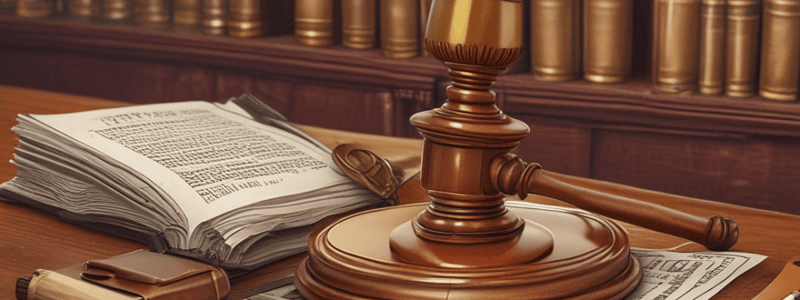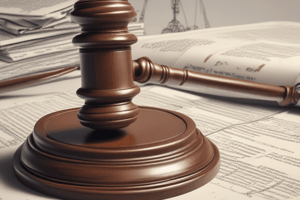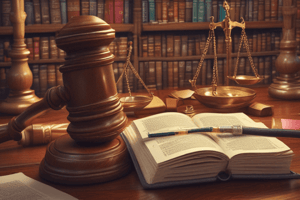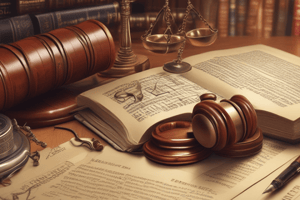Podcast
Questions and Answers
What is the definition of legislation according to the text?
What is the definition of legislation according to the text?
Legislation = written law exacted by a person or body with the authority to do so by the Constitution or legislation.
How long does legislation remain in force according to the text?
How long does legislation remain in force according to the text?
Legislation will remain in force until repealed or amended by a competent lawmaker (legislature) or invalidated by a competent court.
What happened to legislation before 1806 according to the text?
What happened to legislation before 1806 according to the text?
Legislation before 1806 (e.g. Placaats) = common law and therefore abrogated by disuse.
What is the hierarchical order of legislation according to the text?
What is the hierarchical order of legislation according to the text?
How does the text describe the territorial application of old-order legislation?
How does the text describe the territorial application of old-order legislation?
What is the status of provincial ordinances and legislation of the former TBVC states according to the text?
What is the status of provincial ordinances and legislation of the former TBVC states according to the text?
What is the hierarchical structure of legislation in South Africa?
What is the hierarchical structure of legislation in South Africa?
Define subordinate legislation and explain its relationship with primary legislation.
Define subordinate legislation and explain its relationship with primary legislation.
What happens to subordinate legislation if the enabling Act is declared unconstitutional or repealed?
What happens to subordinate legislation if the enabling Act is declared unconstitutional or repealed?
State the principle regarding the authority to repeal or amend legislation.
State the principle regarding the authority to repeal or amend legislation.
What is the relationship between subordinate legislation and its enabling legislation?
What is the relationship between subordinate legislation and its enabling legislation?
Give an example of subordinate legislation mentioned in the text.
Give an example of subordinate legislation mentioned in the text.
Why can't Parliament delegate the power to amend or repeal an Act of Parliament to a subordinate legislator?
Why can't Parliament delegate the power to amend or repeal an Act of Parliament to a subordinate legislator?
What is the difference between Parliament repealing or amending an Act, versus repealing subordinate legislation?
What is the difference between Parliament repealing or amending an Act, versus repealing subordinate legislation?
What types of documents are not considered legislation, and why?
What types of documents are not considered legislation, and why?
What is the definition of law of general application?
What is the definition of law of general application?
What is the hierarchy of legislation, from highest to lowest?
What is the hierarchy of legislation, from highest to lowest?
How does the company analogy illustrate the hierarchy of legislation?
How does the company analogy illustrate the hierarchy of legislation?
What is the difference between a process and a procedure in legal terminology?
What is the difference between a process and a procedure in legal terminology?
Explain the concept of parliamentary sovereignty and how it relates to constitutional supremacy and judicial supremacy.
Explain the concept of parliamentary sovereignty and how it relates to constitutional supremacy and judicial supremacy.
What is the difference between a ratio decidendi and an obiter dictum in the context of case law?
What is the difference between a ratio decidendi and an obiter dictum in the context of case law?
Distinguish between codified and uncodified law, providing examples of each.
Distinguish between codified and uncodified law, providing examples of each.
What is the difference between foreign law and international law? Provide an example of each.
What is the difference between foreign law and international law? Provide an example of each.
Explain the concept of legalese and its implications for accessibility and access to justice.
Explain the concept of legalese and its implications for accessibility and access to justice.
Flashcards are hidden until you start studying




